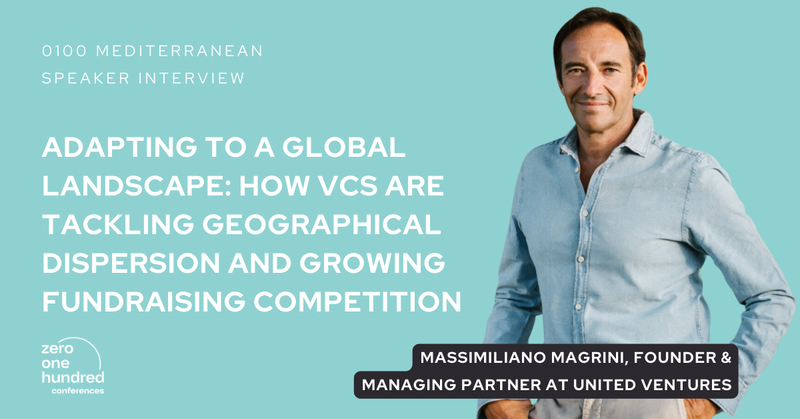In this speaker interview, we sat down with Massimiliano Magrini, Founder and Managing Partner at United Ventures, an Italian venture capital firm committed to supporting visionary entrepreneurs who are reinventing industries through technology.

Massimiliano will be joining the upcoming panel discussion on “Venture Fundraising: Key Drivers & Challenges. LP-GP Dynamics" at the 0100 Conference Mediterranean, where he will be sharing the stage with notable industry leaders, including Heinrich Riehl, Director of Fundraising at VenCap, Christiana Manzocco, Director of Investments at Alberta Enterprise Corporation, Guillaume Carnein, Vice President at Quadrille, and moderated by Dominic Maier, Partner at AXA Venture Partners.
Do not miss Massimiliano's insights on the evolving venture capital landscape, how specialization and differentiation are shaping fundraising strategies, and the key factors driving successful LP-GP relationships in today’s competitive market.
What are the key factors driving successful venture fundraising in today’s market, and how have these evolved over the past few years?
Traditionally, the venture capital landscape was characterized by a relatively fixed number of managers and LPs with established allocations. Over the past decade, the rise of tech hyper scalers and a low-interest-rate environment significantly increased LP appetite. They attracted a wave of new GPs to the venture capital market. Key factors driving successful venture fundraising today include specialization within specific verticals, particularly for newer firms, and a strong focus on founders for more established players. At United Ventures, we've always strived to balance our focus on supporting exceptional founders by identifying promising sub-sectors within the broader tech landscape.
LPs often evaluate GPs by comparing past performance with future projections. How do you ensure alignment between your track record and your forward-looking strategy during fundraising?
Strong performance is directly linked to a well-defined investment framework deeply ingrained in a firm's culture. Venture capital is a long-term, endurance game, and consistent returns are most likely achieved through a stable partnership and a consistent approach. Therefore, we emphasize maintaining a consistent investment culture, ensuring that our principles and approach are passed down from experienced partners to newer team members. This continuity helps ensure alignment between our track record and future strategy, giving LPs confidence in our ability to deliver consistent results.
How has the competitive landscape for venture capital fundraising changed in your experience, especially with the increasing number of funds and alternative investment vehicles?
The VC fundraising landscape has changed a lot. It's become far more geographically dispersed, reflecting the understanding that successful entrepreneurs can emerge from anywhere. This creates a challenge for VCs: building a truly global network of like-minded investors who can effectively support the growth of startups across different regions. This increased competition also requires a more focused approach to differentiation, highlighting unique investment strategies, sector expertise, and value-add beyond just capital.
Are there specific trends or sectors that investors are currently prioritizing in their allocation decisions? How has this influenced your approach when pitching to LPs?
While hyper-specialization within specific verticals has become a major trend in fundraising, I believe its effectiveness lies more in attracting LPs than in actual capital deployment. It can be reassuring for asset managers as it mirrors practices from public market allocations. But while we develop strong theses around promising sectors, we also recognize the importance of leaving room for serendipity and founder-driven innovation. For example, a strictly AI-focused fund in the early days might have missed out on Nvidia, given their initial focus on GPUs for video games, which later became fundamental to AI development. Therefore, when pitching to LPs, we emphasize a balanced approach: demonstrating sector expertise while remaining open to unexpected opportunities.
How do the dynamics differ between GPs and institutional LPs versus private investors during the fundraising process?
The dynamics between institutional LPs and private investors differ significantly during fundraising. Institutional LPs typically have a more structured and rigorous due diligence process, focusing on metrics like historical performance, team stability, and the fund's legal agreements. They often have established investment mandates and require detailed reporting. Private investors, on the other hand, tend to be more flexible and relationship-driven. They often prioritize finding like-minded investors and may be more receptive to unique investment theses or favorable deal terms. Their decision-making process can be quicker and less formalized compared to institutional LPs.
What are the most common concerns or expectations that LPs have when considering an investment in a fund?
LPs typically prioritize alignment of interests, ensuring the GP's incentives match their own. They scrutinize the quality and experience of the investment team, looking for expertise, stability, and a clear succession plan. A consistent investment strategy and culture are also critical, with LPs seeking a well-defined thesis, disciplined approach, and strong market understanding. Demonstrated track record is a key factor, although past performance isn't the sole determinant. And in general, transparency and open communication are also essential, with LPs expecting clear and timely reporting on fund performance and activities. These factors collectively help LPs assess the potential for strong returns and alignment with their overall investment objectives.
How important are ESG and impact reportability capabilities when engaging with LPs?
ESG has become essential when engaging with LPs. It's no longer a "nice-to-have" but a core requirement. LPs are focused on ESG performance as a key indicator of long-term value and risk, demanding more detailed data than ever before. This presents a real challenge, particularly for firms with diverse portfolios where companies are at different stages of ESG maturity. At United Ventures, we've recognized this shift and proactively adopted a specialized ESG platform to streamline data collection and reporting, providing valuable insights and benchmarks. This proactive approach demonstrates our commitment to transparency and responsible investment, which resonates strongly with our LPs.

